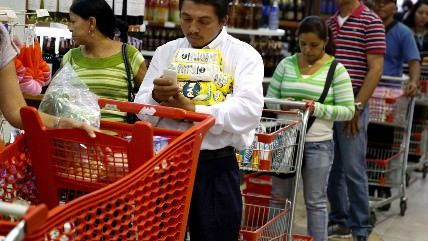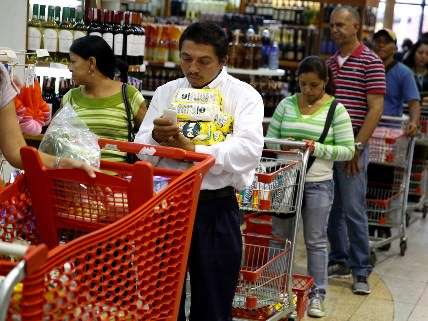Venezuela to Fingerprint Supermarket Shoppers

When artificial price controls fail to bring food to the poor and instead lead to catastrophic shortages for everyone, what do you do? If you are Venezuelan President Nicolas Maduro, you don't admit that the socialist policy you inherited from the late Hugo Chavez is a failure, you double-down by ordering all supermarket shoppers to be fingerprinted as a means of preventing "fraud."

From the BBC:
President Nicolas Maduro of Venezuela has announced a mandatory fingerprinting system in supermarkets to combat food shortages and smuggling.
He said the system would stop people from buying too much of a single item.
But the opposition in Venezuela rejected the plan, saying the policy treated all Venezuelans as thieves.
Critics said fingerprinting consumers of staple products was tantamount to rationing and constituted a breach of privacy.
Fingerprinting follows only four months after Marduro mandated all Venezuelans to use a "Secure Food Supply" card, which according to The Guardian:
will limit Venezuelans to once-a-week shopping and will set off an alarm to halt any transaction if a purchaser breaks the rules. The government wants to prevent individual shoppers from "over-buying" in a country hit by acute shortages of basic items including milk, sugar and toilet paper. Critics say it is an admission of failure of economic policy in one of the world's big oil-producing nations.
Venezuela continues to be plagued by staggering murder rates, inflation and scarcity of many basic cooking staples. Anger over empty supermarket shelves in a country with the world's largest oil reserves was a primary cause of the massive protests from earlier this year, which were violently suppressed by government forces.
Even one-time "revolutionaries" of Chavez's Bolivarian Revolution, which was supported by most of Venezuela's poor, are growing weary with failed top-down economic policies. Also from The Guardian:
For some, the recent move is nothing short of a Cuban-style rationing card that will sooner or later hamper citizens' economic freedoms.
"I don't want to be told what I can buy and when I can buy it. That's what I work for. I am a revolutionary but I didn't go into this wanting it to become Cuba," says Mercedes Azuaje as she exits a corner shop with an almost empty bag of groceries.


Show Comments (88)